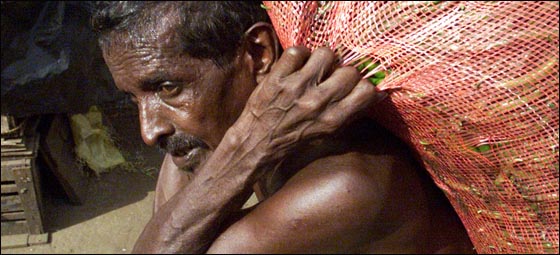 |
| It will have a major impact on poor people |
Rarely do politicians tell the truth. However, in this instance, the Deputy Minister of Finance, Dr. Sarath Amunugama, has chosen to do so. And in doing so, he has allowed us to have a peek into the sorry state of affairs the country’s economy is in, especially when it comes to the growing gap between income and expenditure.
It is telling that of all the places and occasions, the minister chose the opening ceremony of a People’s Bank Service Centre in the Kandy District to admit the stark truth – there is no option other than printing money or taking loans to bridge the current budget deficit.
In his own words, Sri Lanka needs one thousand seven hundred (1,700) billion rupees as annual overall expenditure, as the annual income is only one thousand two hundred (1,200) billion rupees.
He also stated: “The deficit is a gigantic Rs 500 billion. To fill this gap we have no option other than printing money or borrowing from foreign countries. We are faced with a major challenge to fill this gap. If we print money, it will create inflation in the economy. It will have a major impact on poor people. Every government tries to lower inflation. In my view, without increasing the salary of government servants, you should try to lower inflation. Under the President’s Financial Management, inflation, which was at 20%, has been lowered to 7%. Our aim is to bring inflation down to 5.2% by 2013.”
Candid comments notwithstanding, Dr. Amunugama does not specify as to how a record deficit of rupees five hundred billion could be offset. He offers two alternatives, yet refrains from going any further.
His lament about people having to undergo immense economic hardships due to the ever-escalating cost of living seems to be a well-crafted empty rhetoric aimed at building an image for himself as one politician who could feel empathetic towards the common man on the street. He might succeed in that short-term political gimmick, yet he will fall far short of offering a valid and legitimate economic solution to the burning issue of decreasing standards of living for ninety nine per cent (99%) of the country’s population , while the privileged one per cent (1%) gets enriched.
Even in a rich country like the United States of America, in the recently concluded Presidential Elections, the people voted for a man who stood for the middle class, as against a personally-rich candidate like Mitt Romney, whose image was defined as an elitist super-rich guy talking for the super-super-rich one per cent (1%) of the population.
After presenting a budget that offered almost nothing definitive and financially-consoling for the poorer, and making it one of the most bizarre of all budget proposals in exempting racing cars from all taxes, the government really exposed its obscene hand, which hitherto has been kept concealed from the general public.
The naked gesture of removing a ‘super-luxury’ item such as racing cars from taxes represents a mindset of a Finance Minister whose short-sighted economic policies could not offer anything substantial to the average man as a matter of substance, while in the context of approach, it tells a tragic story of an uncaring ruling cabal whose regard for fundamental human judgment is blind and callously vulgar.
Domestic production is at a standstill. Investment in the agriculture sector is minimal, while infrastructure development is undertaken with the aid of borrowed cash from foreign Banks on commercial rates. People speculate that these massive infrastructure projects are undertaken not for the benefit of the county but for the personal riches in terms of ‘commissions’ they bring forth to the politicians who are charged with implementing these ‘white elephant’ projects and ‘schemes’.
One can understand if the country is still in the grips of a ‘socialist economy’. But it is not so. The country has turned from a quasi-capitalist economy to a crony-capitalist economy, especially during the last ten years. Those who are close to the ruling court benefit immensely while the hardworking wage earner is stripped of his surplus cash by way of escalating prices of essential items.
Incomes remain stagnant, while expenditure is on the rise. As Dr. Amunugama himself professed, a country cannot go on spending more than it earns, so is the case for any man, woman or a family. Mr. Deputy Minister of Finance, just telling the truth about the state of economy is not enough; offer some solutions, if they are bitter, be it so, but have the guts to tell the people the bitter truth about your solutions too.
CT
